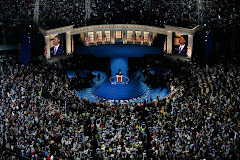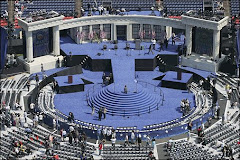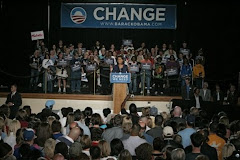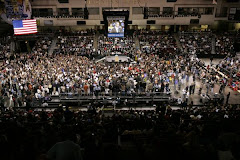 Recently there has been a media din that there is this Clinton mystique, this urban myth that somehow, someway, the Clinton's are going to get the superdelegates to overturn the ballot box and caucus results of the rank & file Democratic voters and nominate Hillary Rodham Clinton. Don't believe it for it is a fairytale, a movie script, a fisherman's tall tale.
Recently there has been a media din that there is this Clinton mystique, this urban myth that somehow, someway, the Clinton's are going to get the superdelegates to overturn the ballot box and caucus results of the rank & file Democratic voters and nominate Hillary Rodham Clinton. Don't believe it for it is a fairytale, a movie script, a fisherman's tall tale.
This political illusion is fed by the fictitious premise that somehow, someway the Clinton campaign is going to eventually emerge with popular vote, which by all calculations would be a modern-day miracle on the level of a Biblical story. Politico.com's Jim VandeHei and Mike Allen did a story on this which makes for a MUST READ titled: Story behind the story: The Clinton Myth. People who think that scenario is even remotely likely are living on another planet.
As it happens, many people inside Clinton’s campaign live right here on Earth. One important Clinton adviser estimated to Politico privately that she has no more than a 10 percent chance of winning her race against Barack Obama, an appraisal that was echoed by other operatives.
In other words: The notion of the Democratic contest being a dramatic cliffhanger is a game of make-believe.
The real question is why or how this make-believe is happening? Vandehei & Allen say that the press have become partners with the Clintons in promoting this snake-oil sell job because of all things a self interest to carry on the race for of all things----love of a close race that just happens to make money.
One important, if subliminal, reason is self-interest. Reporters and editors love a close race — it’s more fun and it’s good for business.
The media are also enamored of the almost mystical ability of the Clintons to work their way out of tight jams, as they have done for 16 years at the national level. That explains why some reporters are inclined to believe the Clinton campaign when it talks about how she’s going to win on the third ballot at the Democratic National Convention in August.
That’s certainly possible — and, to be clear, we’d love to see the race last that long — but it’s folly to write about this as if it is likely.
Looking at the numbers currently Obama holds a 703,000 (2.6%) vote lead 13.281M to 12.577M. In of itself a 700,00 vote lead is significant but it would take Clinton winning 60% of the remaining primaries to wrestle the popular vote lead. That said it is not that easy, for she only won by that margin in three states, New York, Rhode Island and Arkansas where Obama has won by that margin in 17 states. Even if Pennsylvania comes to the polls with record numbers, the greatest estimate that Clinton could only gain 300,000 on the lead. This loss will probably be all but made up with Guam, North Carolina and Indiana.
West Virginia will probably go with Clinton, but alas Oregon could go with Obama in excess of 60% again negating any gain Clinton hoped to gain with the border state Kentucky on the same day. Where with Puerto Rico, Montana and South Dakota Obama could actually extend his popular lead or at least hold serve. Politico continues: The other elephant in the room for Clinton is that Obama is almost certain to win North Carolina, with its high percentage of African-American voters, and also is seen as extremely strong in Oregon.
Harold Ickes, an icon of the Democratic Party who is Clinton’s chief delegate strategist, points out that every previous forecast about this race has been faulty.
Asked about the Obama campaign’s contention that it’s mathematically impossible for Clinton to win, Ickes replied: “They can’t count. At the end of it, even by the Obama campaign’s prediction, neither candidate will have enough delegates to be nominated.”
This is true, as a matter of math. But even the Clinton campaign’s own best-case scenario has her finishing behind Obama when all the nominating contests are over.
"She will be close to him but certainly not equal to him in pledged delegates,” a Clinton adviser said. “When you add the superdelegates on top of it, I’ll think she’ll still be behind him somewhat in total delegates — but very, very close.”The total gap is likely to be 75 to 110, the adviser said.
That means Clinton would need either some of those pledged delegates to switch their support — which technically they can do, though it would be unlikely — or for the white-dominated group of superdelegates to join forces with her to topple Obama.
To foster doubt about Obama, Clinton supporters are using a whisper and pressure campaign to make an 11th-hour argument to party insiders that he would be a weak candidate in November despite his superior standing at the moment.
“All she has left is the electability argument,” a Democratic official said. "It’s all wrapped around: Is there something that makes him ultimately unelectable?”
But the audience for that argument, the superdelegates, will not easily overturn the will of the party’s voters. And in fact, a number of heavyweight Democrats are looking at the landscape and laying the groundwork to dissuade Clinton from trying to overturn the will of the party rank and file.
House Speaker Nancy Pelosi (D-Calif.), who has not endorsed either candidate, appears to be among them. She told Bloomberg Television that superdelegates should "respect for what has been said by the people.” And she told ABC’s “This Week” that it would be “harmful to the Democratic Party” if superdelegates overturn the outcome of elections.
A Democratic strategist said that given the unlikelihood of prevailing any other way, Clinton now must “scare” superdelegates “who basically just want to win.”
The strategist said Clinton aides are now relying heavily on the controversy over Obama’s retiring minister, the Rev. Jeremiah Wright, to sow new seeds of doubt.
“This issue is the first thing that’s come along that I think is potentially fatal to his electability argument,” the strategist said. “They’re looking ahead and saying: Is it possible this thing is just going to drip, drip, drip, drip — more video? Where does that leave us if he’s our presumptive nominee and he’s limping into the convention and the Republicans are just read to go on him, double-barreled?
”The strategist also said Clinton’s agents are making more subtle pitches. “I’ve heard people start to say: Have you looked at the vote in Ohio really carefully? See how that breaks down for him. What does that portend?” said the strategist. “Then they point to Pennsylvania: In electorally important battleground states, if he is essentially only carrying heavy African-American turnout in high-performing African-American districts and the Starbucks-sipping, Volvo-driving liberal elite, how does he carry a state like Pennsylvania?”
Her advisers say privately that the nominee will be clear by the end of June. At the same time, they recognize that the nominee probably is clear already.
What has to irk Clintons’ aides is that they felt she might finally have him on the ropes, bruised badly by the Wright fight and wobbly in polls. But the bell rang long ago in the minds of too many voters.
































